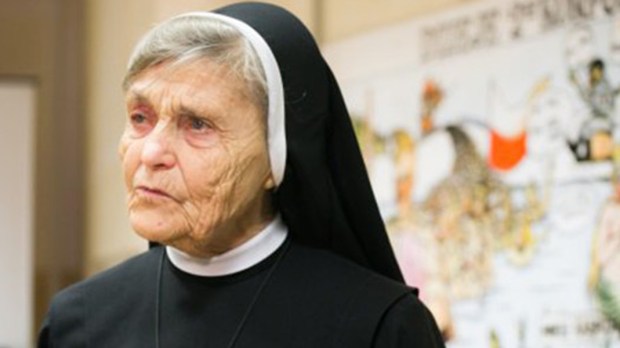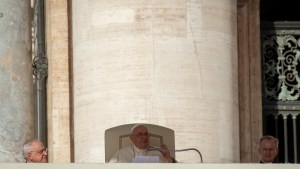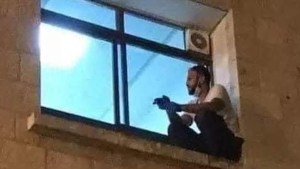In June 2017, Pope Francis conferred on the heroic Polish religious sister, Sr. Rafaela Wlodarczak, the Pro Ecclesia et Pontifice cross.
For five decades, Sr. Rafaela’s life was tied with the Home of Peace for child victims of the protracted Israeli-Palestinian conflict. The home was established on December 8, 1967, as the “Home of Peace on the Mountain of Olives” in Jerusalem.
Can you imagine a religious sister in heavy rubber boots, carrying building materials or heavy steel girders on her back to build a house? Still, this is really nothing when compared to the full story of Sr. Rafaela’s struggle for a better tomorrow for war orphans and Arab Christians in the Holy Land. Despite the many trials and tribulations, she managed to build two children’s homes, in Jerusalem and Bethlehem, in the Palestinian Territories.
Difficult beginnings
Many children were orphaned by the Israeli-Palestinian Six-Day War. “Left alone, they lived literally on the street or in cemeteries,” recalled Sr. Rafaela in a 2018 interview. They ate food scavenged from garbage. Some of them were seemingly in a better position as they were given food in return for their work. This work, however, was too exhausting for children.
“We decided to take care of them and create a home for them,” Sr. Rafaela said. Together with Sr. Imelda Płotka, she began to “collect” orphaned children from the street. At the beginning, their home was limited to a few hired rooms, courtesy of Fr. Ludwik Semkowski SJ. To raise money for food for their children, the sisters played guitar and sang Polish songs.
They always managed to collect the necessary funds. Sr. Rafaela joked that the guitar she played on did not have all the strings, so she’s actually she not sure whether the donors were concerned about the orphans or were just trying to dissuade her from singing further.
However, the money was only enough for such food, clothes and school supplies; they couldn’t raise enough to cover the rent. It was at that moment that Providence intervened. When the sisters were raising money in the streets of Jerusalem, a swanky Mercedes pulled over in front of them. A man got out of the car, asked if the nuns were taking care of war orphans, gave them an envelope with one thousand dollars, and left.
Dream home
The sisters dreamed about a home for children. It seemed unreal, however, until a donor gave them a plot of land with that also had a cave. “For us it was the most beautiful place in the world: the Mount of Olives overlooking the old Jerusalem. We applied for a building permit and when it did not come for a long time, we started the construction without it,” recalls the nun. However, it was difficult to hide the construction of a children’s home in such an attractive location. A court hearing was held to determine if the facility would be allowed to continue construction or be demolished.
“It was incredible, but the Israeli judge assured us that he would not allow the demolition of the orphanage, because the sisters and the children have the right to live in it,” explained Sr. Rafaela. The judge paid a high price for the judgment – he was dismissed and sent to the provinces.
Construction was able to proceed at full speed, though discreetly. Sometimes, to keep a low profile, the sisters had to carry pieces of steel on their backs at night. Finally, the Home of Peace was opened on December 8, 1967. Cardinal Jan Król from Philadelphia blessed the building. Several hundred have since found shelter there.
Heroic sisters and razor wire
In March 2000, John Paul II visited the Holy Land. In the Patriarchate of Jerusalem he met, among others, the Sisters of St. Elisabeth, including Sr. Rafaela and the children from the Home of Peace. Shortly after this event, Ariel Sharon provocatively entered the area of the former Jerusalem temple, which triggered a wave of riots in the Holy Land. In retaliation, the Israeli army cordoned off the city of Bethlehem. No one could enter or leave the city.
Earlier, the sisters had driven several children to their families in Bethlehem. No one could have predicted that the situation would get so complicated. After a few days, the mother of the children rang, begging the nuns to take them back, because there was nothing to eat in Bethlehem. Sr. Rafaela and Sr. Kryspina (then both over 70 years old) set off on foot from Jerusalem to Bethlehem.
They carried a cross and the flag of the Vatican in their hands. “A demonstration against the blockade of Bethlehem was taking place at that time. Seeing us, the journalists started to ask why we were trying to enter the besieged city, as nobody would let us in,” recalled Sr. Rafael.
When she and Sr. Kryspina reached the military cordon, a soldier ran up to them with a loaded rifle. He told them to turn back.
“We explained that we were going to Bethlehem to help hungry children. Our negotiations were to no avail, so I wanted to talk with the soldier’s commanding officer. He was also unyielding.” Irritated, Sr. Rafaela asked if he had been talking to his grandparents about concentration camps and the children who did not receive any help during the war.
“Hearing those words, the officer paled and let us pass. But he warned us that we could only stay there for two hours. Fortunately, it was enough to find the children and safely return home to Jerusalem.”
Home of peace
Another remarkable aspect of this story is the fact that a a decade-plus later, Sr. Rafaela, with the help of benefactors from around the world, managed to build a second children’s home in Bethlehem. This time it was located in the vicinity of the separation wall surrounding the city.
“All these years we tried to teach our children that the most important thing is life is to be able to forgive. No matter what. Many of our children have graduated from university and found a good job. Some have started their own families. I hope that they will carry light into many people’s lives,” Sister Rafaela said.
Editor’s note: This article originally appeared in January, 2018. Sister Rafaela Włodarczak died on December 12, 2019. The work that she began continues to help orphaned children in the Holy Land.



